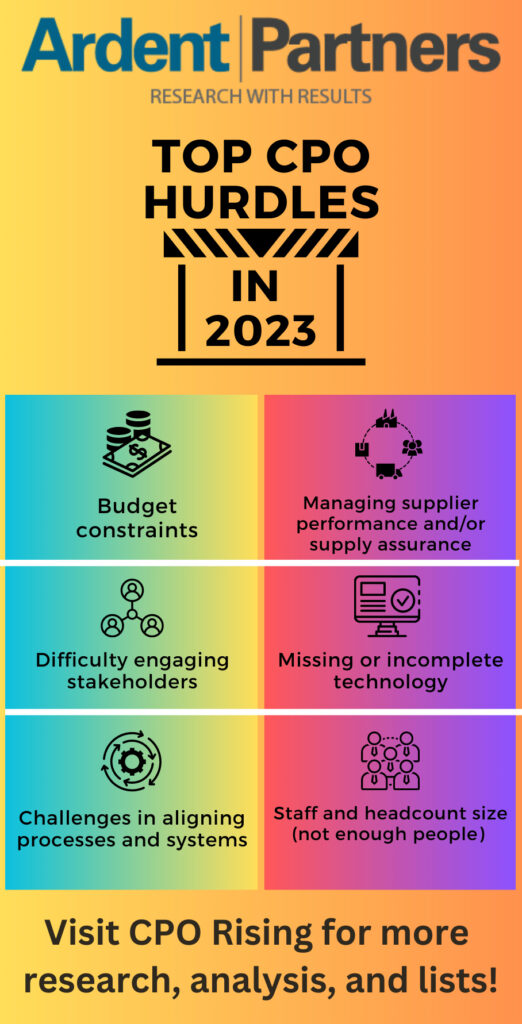Fridays (in 2023) means that it’s time for another CPO Rising Listicle. Each list will include a variety of procurement tips, trends, insights, research, lists, strategies, and/or recommendations designed to help procurement teams improve operations. We’ll also include a summary graphic for you to share with your team.
Top Barriers to CPO Success in 2023
While the barriers to success in 2023 are not nearly as large as they were during the pandemic, CPOs believe that there are sizable hurdles ahead.
1) Budget constraints: Inflation and the cost of capital are hitting enterprise budget-holders, making procurement more important to them this year than in recent times. CPOs will be smart to deliver clear, consistent communication to the enterprise leadership team, in general, and the CFO, specifically, about specific opportunities that procurement could tackle, given additional investment in 2023.
2) Managing supplier performance and/or supply assurance: Supplier performance and supply assurance challenges are prompting more CPOs to consider secondary sources of supply or onshoring/nearshoring of suppliers for tighter integration and increased performance management. Internal collaboration and communication are table stakes to optimize the impact on supplier performance and innovation.
3) Difficulty engaging stakeholders: Remote/hybrid workforces have added difficulty to normal collaboration and strategic planning. Outbound marketing and communication, better video presentation training for staff, and an executive call for more collaboration with procurement are among Ardent’s recommended strategies.
4) Missing or incomplete technology: The difficulty in scaling procurement operations is exacerbated by existing technology gaps, another CPO hurdle. The need for more savings has spiked, clearing the way for procurement to seek greater technology investment.
5) Challenges in Aligning Processes and Systems: It’s the classic “cart before the horse” scenario. Enterprise-level process and system alignment are crucial for effective stakeholder engagement and strategic decision-making.
6) Staff and Headcount Size (not enough people): Labor challenges continue to plague organizations as they struggle to attract talent. However, enterprises have embraced and operationalized remote and hybrid workforce models that became necessary during the height of the pandemic. CPOs are striking a balance between the need for employee flexibility and in-person collaboration.

RELATED RESEARCH
CPO Rising Listicle: Five CPO Strategies to Help Manage Uncertainty
Time to Rekindle the CFO-CPO Relationship
CPO Rising Listicle: Five Smart Strategies to Battle Inflation
Becoming a CPO in 2023: The One Constant is Change
The Macro-Level Issues Impacting the CPO Right Now: Supply Assurance

